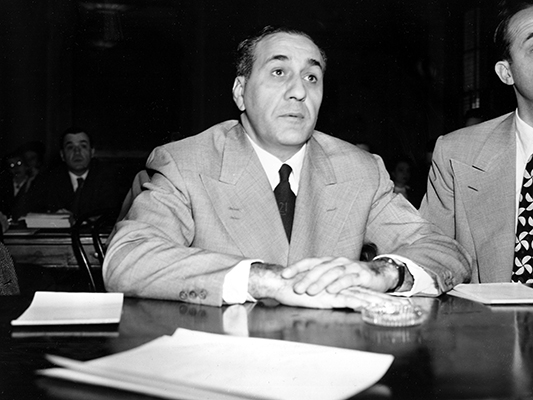Tony Accardo

Born: April 28, 1906, Chicago
Died: May 22, 1992, Palm Springs, California
Nicknames: Joe Batters, Big Tuna
Associations: Al Capone, Paul Ricca, Sam Giancana, Joey Aiuppa
One of the most successful and powerful Mob bosses in American history, Tony “Joe Batters” Accardo ruled the Outfit in Chicago in one capacity or another for more than four decades. The ruthless boss crafted an epic reputation in gangland circles for his uncanny ability to continually shield himself from legal harm and evoke undying loyalty from his troops throughout his 45-year reign.
As a young hoodlum, Accardo worked as a bodyguard and driver for the legendary Chicago Outfit boss Al Capone. In the possibly apocryphal story of Capone having two of his henchmen beaten to death with a baseball bat, “Joe Batters” is sometimes named as the slugger. But he did earn his nickname for his reputation of wielding a bat against debtors and extortion victims. When Capone was sent to prison in 1932, Accardo rose to capo of his crew and headed the Outfit’s enforcement unit. After becoming the boss in the 1940s, he insulated himself with a string of front bosses and street bosses while remaining as hands-on and merciless as ever.
In the 1960s, he banished from the United States acting boss Sam “Momo” Giancana, who had become a pop culture icon for his Capone-like high profile. Giancana drew Accardo’s displeasure because of his inability to control his political contacts, most notably the Kennedy administration’s decision to go after organized crime in America after the Chicago Outfit allegedly aided his election. Giancana returned to Chicago in 1974 and was murdered the following year. His death had been ordered apparently for his refusal to share his foreign casino profits in exile and to stop him from testifying before Congress.
Accardo had a thirst for vengeance against anyone willing to cross him. When the architect of his mansion in posh River Forest, Illinois, gave the blueprints to the FBI once the job was done, Accardo doled out swift justice for the betrayal – the architect vanished, never to be found. In the late 1970s, Accardo oversaw a bloody purge of a crew of burglars that had robbed and vandalized his suburban estate while he was on vacation for the Christmas holiday. The crew targeted Accardo after he forced them to return a giant score from a downtown jewelry store because the victim was close to him.
Under Accardo’s leadership, the Outfit branched into new rackets such as coin-operated machines, counterfeiting and cigarette smuggling. He also sent Giancana to take control of the numbers racket in Chicago’s Black neighborhoods. Beyond Chicago, Accardo invested in casinos in Las Vegas and Havana, Cuba. Accardo also extended the Outfit’s influence into non-traditional Mob territories such as Iowa, Nebraska and Oklahoma. Nearby Milwaukee came under his jurisdiction, too, where his longtime ally Frank Balistrieri reigned for four decades.
Gaining the moniker “Big Tuna” for his love of fishing, the Midwestern godfather wasn’t flashy in his ways but was always well dressed and relatively friendly to the various G-Men, newspaper reporters and photographers assigned to document his movements. His skill at developing mutually beneficial relationships with his fellow Mob bosses across the nation grew his power. More than 2,000 guests, many of them Mafia luminaries, came from across the country to Chicago for the wedding of Accardo’s oldest daughter in the spring of 1961.
Consistent with his reputation for dodging the federal government, Accardo was never indicted for his role lording over the desert gaming mecca. Meanwhile, some of his underlings, including then-front boss Joseph “Joey Doves” Aiuppa, went to prison in the 1980s for skimming millions of dollars from the Las Vegas casinos they silently controlled. The FBI insisted the money filtered up to Accardo but could never prove it.
Unlike many of his fellow mobsters, Accardo was a faithful husband, favoring quiet nights at home with his wife, Clarice, over hitting the city’s night spots with a girlfriend or carousing with the guys. They married in 1934 and the union lasted until Accardo died. Toward the end of his life, Accardo walked with the aid of a wooden cane featuring a handle carved into the shape of a fish and frequently offered counsel to his men. In May 1992, he died peacefully at age 86, never having spent more than a day behind bars.




